635 have author last names that start with P have author last names that start with P

Eclectic essays on ethics, education, and much else besides.
Plutarch (Plutarchus), ca. AD 45–120, was born at Chaeronea in Boeotia in central Greece, studied philosophy at Athens, and, after coming to Rome as a teacher in philosophy, was given consular rank by the emperor Trajan and a procuratorship in Greece by Hadrian. He was married and the father of one daughter and four sons. He appears as a man of kindly character and independent thought, studious and learned.
Plutarch wrote on many subjects. Most popular have always been the forty-six Parallel Lives, biographies planned to be ethical examples in pairs (in each pair, one Greek figure and one similar Roman), though the last four lives are single. All are invaluable sources of our knowledge of the lives and characters of Greek and Roman statesmen, soldiers and orators. Plutarch’s many other varied extant works, about sixty in number, are known as Moralia or Moral Essays. They are of high literary value, besides being of great use to people interested in philosophy, ethics, and religion.
The Loeb Classical Library edition of the Moralia is in fifteen volumes, volume XIII having two parts. Volume XVI is a comprehensive Index.

Eclectic essays on ethics, education, and much else besides.
Plutarch (Plutarchus), ca. AD 45–120, was born at Chaeronea in Boeotia in central Greece, studied philosophy at Athens, and, after coming to Rome as a teacher in philosophy, was given consular rank by the emperor Trajan and a procuratorship in Greece by Hadrian. He was married and the father of one daughter and four sons. He appears as a man of kindly character and independent thought, studious and learned.
Plutarch wrote on many subjects. Most popular have always been the forty-six Parallel Lives, biographies planned to be ethical examples in pairs (in each pair, one Greek figure and one similar Roman), though the last four lives are single. All are invaluable sources of our knowledge of the lives and characters of Greek and Roman statesmen, soldiers and orators. Plutarch’s many other varied extant works, about sixty in number, are known as Moralia or Moral Essays. They are of high literary value, besides being of great use to people interested in philosophy, ethics, and religion.
The Loeb Classical Library edition of the Moralia is in fifteen volumes, volume XIII having two parts. Volume XVI is a comprehensive Index.

Eclectic essays on ethics, education, and much else besides.
Plutarch (Plutarchus), ca. AD 45–120, was born at Chaeronea in Boeotia in central Greece, studied philosophy at Athens, and, after coming to Rome as a teacher in philosophy, was given consular rank by the emperor Trajan and a procuratorship in Greece by Hadrian. He was married and the father of one daughter and four sons. He appears as a man of kindly character and independent thought, studious and learned.
Plutarch wrote on many subjects. Most popular have always been the forty-six Parallel Lives, biographies planned to be ethical examples in pairs (in each pair, one Greek figure and one similar Roman), though the last four lives are single. All are invaluable sources of our knowledge of the lives and characters of Greek and Roman statesmen, soldiers and orators. Plutarch’s many other varied extant works, about sixty in number, are known as Moralia or Moral Essays. They are of high literary value, besides being of great use to people interested in philosophy, ethics, and religion.
The Loeb Classical Library edition of the Moralia is in fifteen volumes, volume XIII having two parts. Volume XVI is a comprehensive Index.

Eclectic essays on ethics, education, and much else besides.
Plutarch (Plutarchus), ca. AD 45–120, was born at Chaeronea in Boeotia in central Greece, studied philosophy at Athens, and, after coming to Rome as a teacher in philosophy, was given consular rank by the emperor Trajan and a procuratorship in Greece by Hadrian. He was married and the father of one daughter and four sons. He appears as a man of kindly character and independent thought, studious and learned.
Plutarch wrote on many subjects. Most popular have always been the forty-six Parallel Lives, biographies planned to be ethical examples in pairs (in each pair, one Greek figure and one similar Roman), though the last four lives are single. All are invaluable sources of our knowledge of the lives and characters of Greek and Roman statesmen, soldiers and orators. Plutarch’s many other varied extant works, about sixty in number, are known as Moralia or Moral Essays. They are of high literary value, besides being of great use to people interested in philosophy, ethics, and religion.
The Loeb Classical Library edition of the Moralia is in fifteen volumes, volume XIII having two parts. Volume XVI is a comprehensive Index.

Eclectic essays on ethics, education, and much else besides.
Plutarch (Plutarchus), ca. AD 45–120, was born at Chaeronea in Boeotia in central Greece, studied philosophy at Athens, and, after coming to Rome as a teacher in philosophy, was given consular rank by the emperor Trajan and a procuratorship in Greece by Hadrian. He was married and the father of one daughter and four sons. He appears as a man of kindly character and independent thought, studious and learned.
Plutarch wrote on many subjects. Most popular have always been the forty-six Parallel Lives, biographies planned to be ethical examples in pairs (in each pair, one Greek figure and one similar Roman), though the last four lives are single. All are invaluable sources of our knowledge of the lives and characters of Greek and Roman statesmen, soldiers and orators. Plutarch’s many other varied extant works, about sixty in number, are known as Moralia or Moral Essays. They are of high literary value, besides being of great use to people interested in philosophy, ethics, and religion.
The Loeb Classical Library edition of the Moralia is in fifteen volumes, volume XIII having two parts. Volume XVI is a comprehensive Index.

Eclectic essays on ethics, education, and much else besides.
Plutarch (Plutarchus), ca. AD 45–120, was born at Chaeronea in Boeotia in central Greece, studied philosophy at Athens, and, after coming to Rome as a teacher in philosophy, was given consular rank by the emperor Trajan and a procuratorship in Greece by Hadrian. He was married and the father of one daughter and four sons. He appears as a man of kindly character and independent thought, studious and learned.
Plutarch wrote on many subjects. Most popular have always been the forty-six Parallel Lives, biographies planned to be ethical examples in pairs (in each pair, one Greek figure and one similar Roman), though the last four lives are single. All are invaluable sources of our knowledge of the lives and characters of Greek and Roman statesmen, soldiers and orators. Plutarch’s many other varied extant works, about sixty in number, are known as Moralia or Moral Essays. They are of high literary value, besides being of great use to people interested in philosophy, ethics, and religion.
The Loeb Classical Library edition of the Moralia is in fifteen volumes, volume XIII having two parts. Volume XVI is a comprehensive Index.

Eclectic essays on ethics, education, and much else besides.
Plutarch (Plutarchus), ca. AD 45–120, was born at Chaeronea in Boeotia in central Greece, studied philosophy at Athens, and, after coming to Rome as a teacher in philosophy, was given consular rank by the emperor Trajan and a procuratorship in Greece by Hadrian. He was married and the father of one daughter and four sons. He appears as a man of kindly character and independent thought, studious and learned.
Plutarch wrote on many subjects. Most popular have always been the forty-six Parallel Lives, biographies planned to be ethical examples in pairs (in each pair, one Greek figure and one similar Roman), though the last four lives are single. All are invaluable sources of our knowledge of the lives and characters of Greek and Roman statesmen, soldiers and orators. Plutarch’s many other varied extant works, about sixty in number, are known as Moralia or Moral Essays. They are of high literary value, besides being of great use to people interested in philosophy, ethics, and religion.
The Loeb Classical Library edition of the Moralia is in fifteen volumes, volume XIII having two parts. Volume XVI is a comprehensive Index.

Eclectic essays on ethics, education, and much else besides.
Plutarch (Plutarchus), ca. AD 45–120, was born at Chaeronea in Boeotia in central Greece, studied philosophy at Athens, and, after coming to Rome as a teacher in philosophy, was given consular rank by the emperor Trajan and a procuratorship in Greece by Hadrian. He was married and the father of one daughter and four sons. He appears as a man of kindly character and independent thought, studious and learned.
Plutarch wrote on many subjects. Most popular have always been the forty-six Parallel Lives, biographies planned to be ethical examples in pairs (in each pair, one Greek figure and one similar Roman), though the last four lives are single. All are invaluable sources of our knowledge of the lives and characters of Greek and Roman statesmen, soldiers and orators. Plutarch’s many other varied extant works, about sixty in number, are known as Moralia or Moral Essays. They are of high literary value, besides being of great use to people interested in philosophy, ethics, and religion.
The Loeb Classical Library edition of the Moralia is in fifteen volumes, volume XIII having two parts. Volume XVI is a comprehensive Index.

Eclectic essays on ethics, education, and much else besides.
Plutarch (Plutarchus), ca. AD 45–120, was born at Chaeronea in Boeotia in central Greece, studied philosophy at Athens, and, after coming to Rome as a teacher in philosophy, was given consular rank by the emperor Trajan and a procuratorship in Greece by Hadrian. He was married and the father of one daughter and four sons. He appears as a man of kindly character and independent thought, studious and learned.
Plutarch wrote on many subjects. Most popular have always been the forty-six Parallel Lives, biographies planned to be ethical examples in pairs (in each pair, one Greek figure and one similar Roman), though the last four lives are single. All are invaluable sources of our knowledge of the lives and characters of Greek and Roman statesmen, soldiers and orators. Plutarch’s many other varied extant works, about sixty in number, are known as Moralia or Moral Essays. They are of high literary value, besides being of great use to people interested in philosophy, ethics, and religion.
The Loeb Classical Library edition of the Moralia is in fifteen volumes, volume XIII having two parts. Volume XVI is a comprehensive Index.

Eclectic essays on ethics, education, and much else besides.
Plutarch (Plutarchus), ca. AD 45–120, was born at Chaeronea in Boeotia in central Greece, studied philosophy at Athens, and, after coming to Rome as a teacher in philosophy, was given consular rank by the emperor Trajan and a procuratorship in Greece by Hadrian. He was married and the father of one daughter and four sons. He appears as a man of kindly character and independent thought, studious and learned.
Plutarch wrote on many subjects. Most popular have always been the forty-six Parallel Lives, biographies planned to be ethical examples in pairs (in each pair, one Greek figure and one similar Roman), though the last four lives are single. All are invaluable sources of our knowledge of the lives and characters of Greek and Roman statesmen, soldiers and orators. Plutarch’s many other varied extant works, about sixty in number, are known as Moralia or Moral Essays. They are of high literary value, besides being of great use to people interested in philosophy, ethics, and religion.
The Loeb Classical Library edition of the Moralia is in fifteen volumes, volume XIII having two parts. Volume XVI is a comprehensive Index.

Eclectic essays on ethics, education, and much else besides.
Plutarch (Plutarchus), ca. AD 45–120, was born at Chaeronea in Boeotia in central Greece, studied philosophy at Athens, and, after coming to Rome as a teacher in philosophy, was given consular rank by the emperor Trajan and a procuratorship in Greece by Hadrian. He was married and the father of one daughter and four sons. He appears as a man of kindly character and independent thought, studious and learned.
Plutarch wrote on many subjects. Most popular have always been the forty-six Parallel Lives, biographies planned to be ethical examples in pairs (in each pair, one Greek figure and one similar Roman), though the last four lives are single. All are invaluable sources of our knowledge of the lives and characters of Greek and Roman statesmen, soldiers and orators. Plutarch’s many other varied extant works, about sixty in number, are known as Moralia or Moral Essays. They are of high literary value, besides being of great use to people interested in philosophy, ethics, and religion.
The Loeb Classical Library edition of the Moralia is in fifteen volumes, volume XIII having two parts. Volume XVI is a comprehensive Index.

Eclectic essays on ethics, education, and much else besides.
Plutarch (Plutarchus), ca. AD 45–120, was born at Chaeronea in Boeotia in central Greece, studied philosophy at Athens, and, after coming to Rome as a teacher in philosophy, was given consular rank by the emperor Trajan and a procuratorship in Greece by Hadrian. He was married and the father of one daughter and four sons. He appears as a man of kindly character and independent thought, studious and learned.
Plutarch wrote on many subjects. Most popular have always been the forty-six Parallel Lives, biographies planned to be ethical examples in pairs (in each pair, one Greek figure and one similar Roman), though the last four lives are single. All are invaluable sources of our knowledge of the lives and characters of Greek and Roman statesmen, soldiers and orators. Plutarch’s many other varied extant works, about sixty in number, are known as Moralia or Moral Essays. They are of high literary value, besides being of great use to people interested in philosophy, ethics, and religion.
The Loeb Classical Library edition of the Moralia is in fifteen volumes, volume XIII having two parts. Volume XVI is a comprehensive Index.

Eclectic essays on ethics, education, and much else besides.
Plutarch (Plutarchus), ca. AD 45–120, was born at Chaeronea in Boeotia in central Greece, studied philosophy at Athens, and, after coming to Rome as a teacher in philosophy, was given consular rank by the emperor Trajan and a procuratorship in Greece by Hadrian. He was married and the father of one daughter and four sons. He appears as a man of kindly character and independent thought, studious and learned.
Plutarch wrote on many subjects. Most popular have always been the forty-six Parallel Lives, biographies planned to be ethical examples in pairs (in each pair, one Greek figure and one similar Roman), though the last four lives are single. All are invaluable sources of our knowledge of the lives and characters of Greek and Roman statesmen, soldiers and orators. Plutarch’s many other varied extant works, about sixty in number, are known as Moralia or Moral Essays. They are of high literary value, besides being of great use to people interested in philosophy, ethics, and religion.
The Loeb Classical Library edition of the Moralia is in fifteen volumes, volume XIII having two parts. Volume XVI is a comprehensive Index.

Eclectic essays on ethics, education, and much else besides.
Plutarch (Plutarchus), ca. AD 45–120, was born at Chaeronea in Boeotia in central Greece, studied philosophy at Athens, and, after coming to Rome as a teacher in philosophy, was given consular rank by the emperor Trajan and a procuratorship in Greece by Hadrian. He was married and the father of one daughter and four sons. He appears as a man of kindly character and independent thought, studious and learned.
Plutarch wrote on many subjects. Most popular have always been the forty-six Parallel Lives, biographies planned to be ethical examples in pairs (in each pair, one Greek figure and one similar Roman), though the last four lives are single. All are invaluable sources of our knowledge of the lives and characters of Greek and Roman statesmen, soldiers and orators. Plutarch’s many other varied extant works, about sixty in number, are known as Moralia or Moral Essays. They are of high literary value, besides being of great use to people interested in philosophy, ethics, and religion.
The Loeb Classical Library edition of the Moralia is in fifteen volumes, volume XIII having two parts. Volume XVI is a comprehensive Index.

Eclectic essays on ethics, education, and much else besides.
Plutarch (Plutarchus), ca. AD 45–120, was born at Chaeronea in Boeotia in central Greece, studied philosophy at Athens, and, after coming to Rome as a teacher in philosophy, was given consular rank by the emperor Trajan and a procuratorship in Greece by Hadrian. He was married and the father of one daughter and four sons. He appears as a man of kindly character and independent thought, studious and learned.
Plutarch wrote on many subjects. Most popular have always been the forty-six Parallel Lives, biographies planned to be ethical examples in pairs (in each pair, one Greek figure and one similar Roman), though the last four lives are single. All are invaluable sources of our knowledge of the lives and characters of Greek and Roman statesmen, soldiers and orators. Plutarch’s many other varied extant works, about sixty in number, are known as Moralia or Moral Essays. They are of high literary value, besides being of great use to people interested in philosophy, ethics, and religion.
The Loeb Classical Library edition of the Moralia is in fifteen volumes, volume XIII having two parts. Volume XVI is a comprehensive Index.

Eclectic essays on ethics, education, and much else besides.
Plutarch (Plutarchus), ca. AD 45–120, was born at Chaeronea in Boeotia in central Greece, studied philosophy at Athens, and, after coming to Rome as a teacher in philosophy, was given consular rank by the emperor Trajan and a procuratorship in Greece by Hadrian. He was married and the father of one daughter and four sons. He appears as a man of kindly character and independent thought, studious and learned.
Plutarch wrote on many subjects. Most popular have always been the forty-six Parallel Lives, biographies planned to be ethical examples in pairs (in each pair, one Greek figure and one similar Roman), though the last four lives are single. All are invaluable sources of our knowledge of the lives and characters of Greek and Roman statesmen, soldiers and orators. Plutarch’s many other varied extant works, about sixty in number, are known as Moralia or Moral Essays. They are of high literary value, besides being of great use to people interested in philosophy, ethics, and religion.
The Loeb Classical Library edition of the Moralia is in fifteen volumes, volume XIII having two parts. Volume XVI is a comprehensive Index.

Comparative biographies of distinguished Greeks and Romans.
Plutarch (Plutarchus), ca. AD 45–120, was born at Chaeronea in Boeotia in central Greece, studied philosophy at Athens, and, after coming to Rome as a teacher in philosophy, was given consular rank by the emperor Trajan and a procuratorship in Greece by Hadrian. He was married and the father of one daughter and four sons. He appears as a man of kindly character and independent thought, studious and learned.
Plutarch wrote on many subjects. Most popular have always been the forty-six Parallel Lives, biographies planned to be ethical examples in pairs (in each pair, one Greek figure and one similar Roman), though the last four lives are single. All are invaluable sources of our knowledge of the lives and characters of Greek and Roman statesmen, soldiers, and orators. Plutarch's many other varied extant works, about sixty in number, are known as Moralia or Moral Essays. They are of high literary value, besides being of great use to people interested in philosophy, ethics, and religion.
The Loeb Classical Library edition of the Lives is in eleven volumes.

Comparative biographies of distinguished Greeks and Romans.
Plutarch (Plutarchus), ca. AD 45–120, was born at Chaeronea in Boeotia in central Greece, studied philosophy at Athens, and, after coming to Rome as a teacher in philosophy, was given consular rank by the emperor Trajan and a procuratorship in Greece by Hadrian. He was married and the father of one daughter and four sons. He appears as a man of kindly character and independent thought, studious and learned.
Plutarch wrote on many subjects. Most popular have always been the forty-six Parallel Lives, biographies planned to be ethical examples in pairs (in each pair, one Greek figure and one similar Roman), though the last four lives are single. All are invaluable sources of our knowledge of the lives and characters of Greek and Roman statesmen, soldiers, and orators. Plutarch's many other varied extant works, about sixty in number, are known as Moralia or Moral Essays. They are of high literary value, besides being of great use to people interested in philosophy, ethics, and religion.
The Loeb Classical Library edition of the Lives is in eleven volumes.

Comparative biographies of distinguished Greeks and Romans.
Plutarch (Plutarchus), ca. AD 45–120, was born at Chaeronea in Boeotia in central Greece, studied philosophy at Athens, and, after coming to Rome as a teacher in philosophy, was given consular rank by the emperor Trajan and a procuratorship in Greece by Hadrian. He was married and the father of one daughter and four sons. He appears as a man of kindly character and independent thought, studious and learned.
Plutarch wrote on many subjects. Most popular have always been the forty-six Parallel Lives, biographies planned to be ethical examples in pairs (in each pair, one Greek figure and one similar Roman), though the last four lives are single. All are invaluable sources of our knowledge of the lives and characters of Greek and Roman statesmen, soldiers, and orators. Plutarch's many other varied extant works, about sixty in number, are known as Moralia or Moral Essays. They are of high literary value, besides being of great use to people interested in philosophy, ethics, and religion.
The Loeb Classical Library edition of the Lives is in eleven volumes.

Comparative biographies of distinguished Greeks and Romans.
Plutarch (Plutarchus), ca. AD 45–120, was born at Chaeronea in Boeotia in central Greece, studied philosophy at Athens, and, after coming to Rome as a teacher in philosophy, was given consular rank by the emperor Trajan and a procuratorship in Greece by Hadrian. He was married and the father of one daughter and four sons. He appears as a man of kindly character and independent thought, studious and learned.
Plutarch wrote on many subjects. Most popular have always been the forty-six Parallel Lives, biographies planned to be ethical examples in pairs (in each pair, one Greek figure and one similar Roman), though the last four lives are single. All are invaluable sources of our knowledge of the lives and characters of Greek and Roman statesmen, soldiers, and orators. Plutarch's many other varied extant works, about sixty in number, are known as Moralia or Moral Essays. They are of high literary value, besides being of great use to people interested in philosophy, ethics, and religion.
The Loeb Classical Library edition of the Lives is in eleven volumes.

Comparative biographies of distinguished Greeks and Romans.
Plutarch (Plutarchus), ca. AD 45–120, was born at Chaeronea in Boeotia in central Greece, studied philosophy at Athens, and, after coming to Rome as a teacher in philosophy, was given consular rank by the emperor Trajan and a procuratorship in Greece by Hadrian. He was married and the father of one daughter and four sons. He appears as a man of kindly character and independent thought, studious and learned.
Plutarch wrote on many subjects. Most popular have always been the forty-six Parallel Lives, biographies planned to be ethical examples in pairs (in each pair, one Greek figure and one similar Roman), though the last four lives are single. All are invaluable sources of our knowledge of the lives and characters of Greek and Roman statesmen, soldiers, and orators. Plutarch's many other varied extant works, about sixty in number, are known as Moralia or Moral Essays. They are of high literary value, besides being of great use to people interested in philosophy, ethics, and religion.
The Loeb Classical Library edition of the Lives is in eleven volumes.

Comparative biographies of distinguished Greeks and Romans.
Plutarch (Plutarchus), ca. AD 45–120, was born at Chaeronea in Boeotia in central Greece, studied philosophy at Athens, and, after coming to Rome as a teacher in philosophy, was given consular rank by the emperor Trajan and a procuratorship in Greece by Hadrian. He was married and the father of one daughter and four sons. He appears as a man of kindly character and independent thought, studious and learned.
Plutarch wrote on many subjects. Most popular have always been the forty-six Parallel Lives, biographies planned to be ethical examples in pairs (in each pair, one Greek figure and one similar Roman), though the last four lives are single. All are invaluable sources of our knowledge of the lives and characters of Greek and Roman statesmen, soldiers, and orators. Plutarch's many other varied extant works, about sixty in number, are known as Moralia or Moral Essays. They are of high literary value, besides being of great use to people interested in philosophy, ethics, and religion.
The Loeb Classical Library edition of the Lives is in eleven volumes.

Comparative biographies of distinguished Greeks and Romans.
Plutarch (Plutarchus), ca. AD 45–120, was born at Chaeronea in Boeotia in central Greece, studied philosophy at Athens, and, after coming to Rome as a teacher in philosophy, was given consular rank by the emperor Trajan and a procuratorship in Greece by Hadrian. He was married and the father of one daughter and four sons. He appears as a man of kindly character and independent thought, studious and learned.
Plutarch wrote on many subjects. Most popular have always been the forty-six Parallel Lives, biographies planned to be ethical examples in pairs (in each pair, one Greek figure and one similar Roman), though the last four lives are single. All are invaluable sources of our knowledge of the lives and characters of Greek and Roman statesmen, soldiers, and orators. Plutarch's many other varied extant works, about sixty in number, are known as Moralia or Moral Essays. They are of high literary value, besides being of great use to people interested in philosophy, ethics, and religion.
The Loeb Classical Library edition of the Lives is in eleven volumes.

Comparative biographies of distinguished Greeks and Romans.
Plutarch (Plutarchus), ca. AD 45–120, was born at Chaeronea in Boeotia in central Greece, studied philosophy at Athens, and, after coming to Rome as a teacher in philosophy, was given consular rank by the emperor Trajan and a procuratorship in Greece by Hadrian. He was married and the father of one daughter and four sons. He appears as a man of kindly character and independent thought, studious and learned.
Plutarch wrote on many subjects. Most popular have always been the forty-six Parallel Lives, biographies planned to be ethical examples in pairs (in each pair, one Greek figure and one similar Roman), though the last four lives are single. All are invaluable sources of our knowledge of the lives and characters of Greek and Roman statesmen, soldiers, and orators. Plutarch's many other varied extant works, about sixty in number, are known as Moralia or Moral Essays. They are of high literary value, besides being of great use to people interested in philosophy, ethics, and religion.
The Loeb Classical Library edition of the Lives is in eleven volumes.

Comparative biographies of distinguished Greeks and Romans.
Plutarch (Plutarchus), ca. AD 45–120, was born at Chaeronea in Boeotia in central Greece, studied philosophy at Athens, and, after coming to Rome as a teacher in philosophy, was given consular rank by the emperor Trajan and a procuratorship in Greece by Hadrian. He was married and the father of one daughter and four sons. He appears as a man of kindly character and independent thought, studious and learned.
Plutarch wrote on many subjects. Most popular have always been the forty-six Parallel Lives, biographies planned to be ethical examples in pairs (in each pair, one Greek figure and one similar Roman), though the last four lives are single. All are invaluable sources of our knowledge of the lives and characters of Greek and Roman statesmen, soldiers, and orators. Plutarch's many other varied extant works, about sixty in number, are known as Moralia or Moral Essays. They are of high literary value, besides being of great use to people interested in philosophy, ethics, and religion.
The Loeb Classical Library edition of the Lives is in eleven volumes.

Comparative biographies of distinguished Greeks and Romans.
Plutarch (Plutarchus), ca. AD 45–120, was born at Chaeronea in Boeotia in central Greece, studied philosophy at Athens, and, after coming to Rome as a teacher in philosophy, was given consular rank by the emperor Trajan and a procuratorship in Greece by Hadrian. He was married and the father of one daughter and four sons. He appears as a man of kindly character and independent thought, studious and learned.
Plutarch wrote on many subjects. Most popular have always been the forty-six Parallel Lives, biographies planned to be ethical examples in pairs (in each pair, one Greek figure and one similar Roman), though the last four lives are single. All are invaluable sources of our knowledge of the lives and characters of Greek and Roman statesmen, soldiers, and orators. Plutarch's many other varied extant works, about sixty in number, are known as Moralia or Moral Essays. They are of high literary value, besides being of great use to people interested in philosophy, ethics, and religion.
The Loeb Classical Library edition of the Lives is in eleven volumes.

Comparative biographies of distinguished Greeks and Romans.
Plutarch (Plutarchus), ca. AD 45–120, was born at Chaeronea in Boeotia in central Greece, studied philosophy at Athens, and, after coming to Rome as a teacher in philosophy, was given consular rank by the emperor Trajan and a procuratorship in Greece by Hadrian. He was married and the father of one daughter and four sons. He appears as a man of kindly character and independent thought, studious and learned.
Plutarch wrote on many subjects. Most popular have always been the forty-six Parallel Lives, biographies planned to be ethical examples in pairs (in each pair, one Greek figure and one similar Roman), though the last four lives are single. All are invaluable sources of our knowledge of the lives and characters of Greek and Roman statesmen, soldiers, and orators. Plutarch's many other varied extant works, about sixty in number, are known as Moralia or Moral Essays. They are of high literary value, besides being of great use to people interested in philosophy, ethics, and religion.
The Loeb Classical Library edition of the Lives is in eleven volumes.

Eclectic essays on ethics, education, and much else besides.
Plutarch (Plutarchus), ca. AD 45–120, was born at Chaeronea in Boeotia in central Greece, studied philosophy at Athens, and, after coming to Rome as a teacher in philosophy, was given consular rank by the emperor Trajan and a procuratorship in Greece by Hadrian. He was married and the father of one daughter and four sons. He appears as a man of kindly character and independent thought, studious and learned.
Plutarch wrote on many subjects. Most popular have always been the forty-six Parallel Lives, biographies planned to be ethical examples in pairs (in each pair, one Greek figure and one similar Roman), though the last four lives are single. All are invaluable sources of our knowledge of the lives and characters of Greek and Roman statesmen, soldiers and orators. Plutarch’s many other varied extant works, about sixty in number, are known as Moralia or Moral Essays. They are of high literary value, besides being of great use to people interested in philosophy, ethics, and religion.
The Loeb Classical Library edition of the Moralia is in fifteen volumes, volume XIII having two parts. Volume XVI is a comprehensive Index.
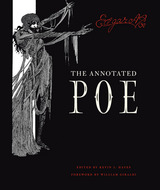
Edgar Allan Poe is perhaps America’s most famous writer. Adapted many times to the stage and screen and an inspiration to countless illustrators, graphic novelists, and musicians, his tales and poems remain a singular presence in popular culture. (His most famous poem inspired the name of the NFL’s Baltimore Ravens.) And then there is the matter of Poe’s literary influence. “How many things come out of Poe?” Jorge Luis Borges once asked. And yet Poe remains misunderstood, his works easily confused with the legend of a troubled genius. Now, in this annotated edition of selected tales and poems, Kevin J. Hayes debunks the Poe myth, enables a larger appreciation of Poe’s career and varied achievements, and investigates his weird afterlives.
With color illustrations and photographs throughout, The Annotated Poe contains in-depth notes placed conveniently alongside the tales and poems to elucidate Poe’s sources, obscure words and passages, and literary, biographical, and historical allusions. Like Poe’s own marginalia, Hayes’s marginal notes accommodate “multitudinous opinion”: he explains his own views and interpretations as well as those of other writers and critics, including Poe himself. In his Foreword, William Giraldi provides a spirited introduction to the writer who produced such indelible masterpieces as “The Fall of the House of Usher,” “The Murders in the Rue Morgue,” and “The Black Cat.”
The Annotated Poe offers much for both the professional and the general reader—but it will be especially prized by those who think of themselves as Poe aficionados.



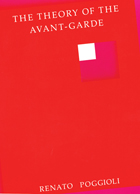

With contributions by Paul Bloom, Helen Sorayya Carr, Edward S. Deevey, Jr., Nancy L. Hamblin, S. E. Garrett-Jones, Hattula Moholy-Nagy, Mary Pohl, Amadeo M. Rea, Don S. Rice, Prudence M. Rice, Julie Stein, B. L. Turner II, Hague H. Vaughan, Richard R. Wilk, Frederick Matthew Wiseman
This volume provides data from interdisciplinary projects produced over the past fifteen years, including palynology, limnology, geography, soil science, faunal analysis, ethnology, and ethnohistory. Centering on differences of opinion rather than on a synthesis of data, this analysis of the methods and theoretical principles by which specialists work yields a unique view of archaeological procedures.

Richard Poirier, one of America's most eminent critics, reveals in this book the creative but mostly hidden alliance between American pragmatism and American poetry. He brilliantly traces pragmatism as a philosophical and literary practice grounded in a linguistic skepticism that runs from Emerson and William James to the work of Robert Frost, Gertrude Stein, and Wallace Stevens, and on to the cultural debates of today.
More powerfully than ever before, Poirier shows that pragmatism had its start in Emerson, the great example to all his successors of how it is possible to redeem even as you set out to change the literature of the past. Poirier demonstrates that Emerson—and later William James—were essentially philosophers of language, and that it is language that embodies our cultural past, an inheritance to be struggled with, and transformed, before being handed on to future generations. He maintains that in Emersonian pragmatist writing, any loss—personal or cultural—gives way to a quest for what he calls “superfluousness,” a kind of rhetorical excess by which powerfully creative individuals try to elude deprivation and stasis. In a wide-ranging meditation on what James called “the vague,” Poirier extols the authentic voice of individualism, which, he argues, is tentative and casual rather than aggressive and dogmatic.
The concluding chapters describe the possibilities for criticism created by this radically different understanding of reading and writing, which are nothing less than a reinvention of literary tradition itself. Poirier's discovery of this tradition illuminates the work of many of the most important figures in American philosophy and poetry. His reanimation of pragmatism also calls for a redirection of contemporary criticism, so that readers inside as well as outside the academy can begin to respond to poetic language as the source of meaning, not to meaning as the source of language.

Why did defeat in the Opium War not lead Ch'ing China to a more realistic appreciation of Western might and Chinese weakness? James Polachek's revisionist analysis exposes the behind-the-scenes political struggles that not only shaped foreign-policy decisions in the 1830s and 1840s but have continued to affect the history of Chinese nationalism in modern times.
Polachek looks closely at the networks of literati and officials, self-consciously reminiscent of the late Ming era that sought and gained the ear of the emperor. Challenging the conventional view that Lin Tse-hsu and his supporters were selfless patriots who acted in China's best interests, Polachek agrues that, for reasons having more to do with their own domestic political agenda, these men advocated a futile policy of militant resistance to the West. Linking political intrigue, scholarly debates, and foreign affairs, local notables in Canton and literati lobbyists in Perking this book sets the Opium War for the first times in its "inner," domestic political context.

"The sordid controversies of litigants," Benjamin Cardozo once said, are "the stuff from which great and shining truths will ultimately be shaped." As one of America's most influential judges, first on New York State's Court of Appeals and then on the United States Supreme Court, Cardozo (1870-1938) oversaw this transformation daily. How he arrived at his rulings, with their far-reaching consequences, becomes clear in this book, the first to explore the connections between Benjamin Cardozo's life and his jurisprudence.
An intensely private man whose friends destroyed much of his correspondence, Cardozo has long eluded scrutiny. But through extraordinary effort Richard Polenberg has uncovered letters, briefs, transcripts, and biographical details to give us a complex living picture of this man whose judicial opinions continue to affect us. Polenberg describes the shaping experiences of Cardozo's youth, among them the death of his mother when he was nine years old; religious training in the Spanish-Portuguese Synagogue; two years of private tutoring by Horatio Alger, Jr.; and his reaction to the scandal that prompted his father to resign from the New York Supreme Court. Then, in light of certain cases that were brought before the Court of Appeals, we see how Cardozo's rulings reflected a system of beliefs rooted in these early experiences; how, despite his famous detachment, Cardozo read evidence and precedents selectively and based his decisions regarding issues from rape and divorce to the insanity plea on his own views about morality, scholarship, and sexuality. Here too is the truth behind Cardozo's renowned liberalism, explored through his rulings on New Deal measures such as the Social Security Act and his more conservative decisions in cases involving conscientious objectors and the rights of criminal defendants.
The Benjamin Cardozo who emerges from these pages, a complicated and intriguing figure, points to a new understanding of the shaping of American law.



An Open Letters Review Best Book of the Year
Angelo Poliziano (1454–1494) was one of the great scholar-poets of the Italian Renaissance and the leading literary figure of Florence in the age of Lorenzo de’ Medici, “il Magnifico.” The poet’s Miscellanies, including a “first century” published in 1489 and a “second century” unfinished at his death, constitute the most innovative contribution to classical philology of the Renaissance. Each chapter is a mini-essay on some lexical or textual problem which Poliziano, drawing on the riches of the Medici Library and Lorenzo’s collection of antiquities, solves with his characteristic mixture of deep learning, analytic skill, and brash criticism of his predecessors. Volume 1 presents a new Latin edition of The First Century of the Miscellanies, and these volumes together present the first translation of both collections into any modern language.

An Open Letters Review Best Book of the Year
Angelo Poliziano (1454–1494) was one of the great scholar-poets of the Italian Renaissance and the leading literary figure of Florence in the age of Lorenzo de’ Medici, “il Magnifico.” The poet’s Miscellanies, including a “first century” published in 1489 and a “second century” unfinished at his death, constitute the most innovative contribution to classical philology of the Renaissance. Each chapter is a mini-essay on some lexical or textual problem which Poliziano, drawing on the riches of the Medici Library and Lorenzo’s collection of antiquities, solves with his characteristic mixture of deep learning, analytic skill, and brash criticism of his predecessors. Volume 1 presents a new Latin edition of The First Century of the Miscellanies, and these volumes together present the first translation of both collections into any modern language.
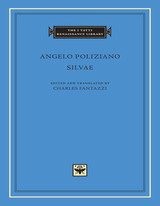






The performance of the British economy in the critical decades before 1914 is the subject of much scholarly debate. This first modern history of the British shipbuilding industry between 1870 and 1914 examines activities and attitudes of the shipbuilders in the context of this controversy over the quality of British entrepreneurship.
The authors consider the effectiveness of marketing practices, the rate of technological change, the degree to which ever-scarcer natural resources impose a constraint on growth, the general economic rationality of entrepreneurs, and, above all, the consequences of management decisions. After carefully weighing all evidence, the authors conclude that the general level of managerial performance was high, and in contrast to other sectors of heavy industry, British shipbuilders were able to maintain their dominant position.

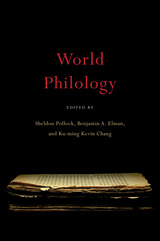
Philology—the discipline of making sense of texts—is enjoying a renaissance within academia after decades of neglect. World Philology charts the evolution of philology across the many cultures and historical time periods in which it has been practiced, and demonstrates how this branch of knowledge, like philosophy and mathematics, is an essential component of human understanding.
Every civilization has developed ways of interpreting the texts that it produces, and differences of philological practice are as instructive as the similarities. We owe our idea of a textual edition for example, to the third-century BCE scholars of the Alexandrian Library. Rabbinical philology created an innovation in hermeneutics by shifting focus from how the Bible commands to what it commands. Philologists in Song China and Tokugawa Japan produced startling insights into the nature of linguistic signs. In the early modern period, new kinds of philology arose in Europe but also among Indian, Chinese, and Japanese commentators, Persian editors, and Ottoman educationalists who began to interpret texts in ways that had little historical precedent. They made judgments about the integrity and consistency of texts, decided how to create critical editions, and determined what it actually means to read.
Covering a wide range of cultures—Greek, Roman, Hebrew, Arabic, Sanskrit, Chinese, Indo-Persian, Japanese, Ottoman, and modern European—World Philology lays the groundwork for a new scholarly discipline.

Polybius (born ca. 208 BCE) of Megalopolis in the Peloponnese (Morea), served the Achaean League in arms and diplomacy for many years, favouring alliance with Rome. From 168 to 151 he was hostage in Rome where he became a friend of Aemilius Paulus and his two sons, and especially adopted Scipio Aemilianus whose campaigns he attended later. In late life he was trusted mediator between Greece and the Romans whom he admired; helped in the discussions which preceded the final war with Carthage; and, after 146, was entrusted by the Romans with details of administration in Greece. He died at the age of 82 after a fall from his horse.
The main part of Polybius's history covers the years 264146 BCE. It describes the rise of Rome to the destruction of Carthage and the domination of Greece by Rome. It is a great work, accurate, thoughtful, largely impartial, based on research, full of insight into customs, institutions, geography, causes of events and character of people; it is a vital achievement of first rate importance, despite the incomplete state in which all but the first five of the forty books have reached us. Polybius's overall theme is how and why the Romans spread their power as they did.
The Loeb Classical Library edition of Polybius is in six volumes.

Polybius (born ca. 208 BCE) of Megalopolis in the Peloponnese (Morea), served the Achaean League in arms and diplomacy for many years, favouring alliance with Rome. From 168 to 151 he was hostage in Rome where he became a friend of Aemilius Paulus and his two sons, and especially adopted Scipio Aemilianus whose campaigns he attended later. In late life he was trusted mediator between Greece and the Romans whom he admired; helped in the discussions which preceded the final war with Carthage; and, after 146, was entrusted by the Romans with details of administration in Greece. He died at the age of 82 after a fall from his horse.
The main part of Polybius's history covers the years 264146 BCE. It describes the rise of Rome to the destruction of Carthage and the domination of Greece by Rome. It is a great work, accurate, thoughtful, largely impartial, based on research, full of insight into customs, institutions, geography, causes of events and character of people; it is a vital achievement of first rate importance, despite the incomplete state in which all but the first five of the forty books have reached us. Polybius's overall theme is how and why the Romans spread their power as they did.
The Loeb Classical Library edition of Polybius is in six volumes.

Polybius (born ca. 208 BCE) of Megalopolis in the Peloponnese (Morea), served the Achaean League in arms and diplomacy for many years, favouring alliance with Rome. From 168 to 151 he was hostage in Rome where he became a friend of Aemilius Paulus and his two sons, and especially adopted Scipio Aemilianus whose campaigns he attended later. In late life he was trusted mediator between Greece and the Romans whom he admired; helped in the discussions which preceded the final war with Carthage; and, after 146, was entrusted by the Romans with details of administration in Greece. He died at the age of 82 after a fall from his horse.
The main part of Polybius's history covers the years 264146 BCE. It describes the rise of Rome to the destruction of Carthage and the domination of Greece by Rome. It is a great work, accurate, thoughtful, largely impartial, based on research, full of insight into customs, institutions, geography, causes of events and character of people; it is a vital achievement of first rate importance, despite the incomplete state in which all but the first five of the forty books have reached us. Polybius's overall theme is how and why the Romans spread their power as they did.
The Loeb Classical Library edition of Polybius is in six volumes.

Polybius (born ca. 208 BCE) of Megalopolis in the Peloponnese (Morea), served the Achaean League in arms and diplomacy for many years, favouring alliance with Rome. From 168 to 151 he was hostage in Rome where he became a friend of Aemilius Paulus and his two sons, and especially adopted Scipio Aemilianus whose campaigns he attended later. In late life he was trusted mediator between Greece and the Romans whom he admired; helped in the discussions which preceded the final war with Carthage; and, after 146, was entrusted by the Romans with details of administration in Greece. He died at the age of 82 after a fall from his horse.
The main part of Polybius's history covers the years 264146 BCE. It describes the rise of Rome to the destruction of Carthage and the domination of Greece by Rome. It is a great work, accurate, thoughtful, largely impartial, based on research, full of insight into customs, institutions, geography, causes of events and character of people; it is a vital achievement of first rate importance, despite the incomplete state in which all but the first five of the forty books have reached us. Polybius's overall theme is how and why the Romans spread their power as they did.
The Loeb Classical Library edition of Polybius is in six volumes.

Polybius (born ca. 208 BCE) of Megalopolis in the Peloponnese (Morea), served the Achaean League in arms and diplomacy for many years, favouring alliance with Rome. From 168 to 151 he was hostage in Rome where he became a friend of Aemilius Paulus and his two sons, and especially adopted Scipio Aemilianus whose campaigns he attended later. In late life he was trusted mediator between Greece and the Romans whom he admired; helped in the discussions which preceded the final war with Carthage; and, after 146, was entrusted by the Romans with details of administration in Greece. He died at the age of 82 after a fall from his horse.
The main part of Polybius's history covers the years 264146 BCE. It describes the rise of Rome to the destruction of Carthage and the domination of Greece by Rome. It is a great work, accurate, thoughtful, largely impartial, based on research, full of insight into customs, institutions, geography, causes of events and character of people; it is a vital achievement of first rate importance, despite the incomplete state in which all but the first five of the forty books have reached us. Polybius's overall theme is how and why the Romans spread their power as they did.
The Loeb Classical Library edition of Polybius is in six volumes.

Polybius (born ca. 208 BCE) of Megalopolis in the Peloponnese (Morea), served the Achaean League in arms and diplomacy for many years, favouring alliance with Rome. From 168 to 151 he was hostage in Rome where he became a friend of Aemilius Paulus and his two sons, and especially adopted Scipio Aemilianus whose campaigns he attended later. In late life he was trusted mediator between Greece and the Romans whom he admired; helped in the discussions which preceded the final war with Carthage; and, after 146, was entrusted by the Romans with details of administration in Greece. He died at the age of 82 after a fall from his horse.
The main part of Polybius's history covers the years 264146 BCE. It describes the rise of Rome to the destruction of Carthage and the domination of Greece by Rome. It is a great work, accurate, thoughtful, largely impartial, based on research, full of insight into customs, institutions, geography, causes of events and character of people; it is a vital achievement of first rate importance, despite the incomplete state in which all but the first five of the forty books have reached us. Polybius's overall theme is how and why the Romans spread their power as they did.
The Loeb Classical Library edition of Polybius is in six volumes.

Hellenistic history.
The historian Polybius (ca. 200–118 BC) was born into a leading family of Megalopolis in the Peloponnese (Morea) and served the Achaean League in arms and diplomacy for many years, favoring alliance with Rome. From 168 to 151 he was held hostage in Rome, where he became a friend of Lucius Aemilius Paulus and his two sons, especially Scipio Aemilianus, whose campaigns, including the destruction of Carthage, he later attended. Late in his life he became a trusted mediator between Greece and the Romans; helped in the discussions that preceded the final war with Carthage; and after 146 was entrusted by the Romans with the details of administration in Greece.
Polybius’ overall theme is how and why the Romans spread their power as they did. The main part of his history covers the years 264–146 BC, describing the rise of Rome, her destruction of Carthage, and her eventual domination of the Greek world. It is a great work: accurate, thoughtful, largely impartial, based on research, and full of insight into customs, institutions, geography, the causes of events, and the character of peoples. It is a vital achievement of the first importance despite the incomplete state in which all but the first five of its original forty books have reached us.
For this edition, W. R. Paton’s excellent translation, first published in 1922, has been thoroughly revised, the Büttner-Wobst Greek text corrected, and explanatory notes and a new introduction added, all reflecting the latest scholarship.
The Loeb Classical Library edition of Polybius is in six volumes.

Hellenistic history.
The historian Polybius (ca. 200–118 BC) was born into a leading family of Megalopolis in the Peloponnese (Morea) and served the Achaean League in arms and diplomacy for many years, favoring alliance with Rome. From 168 to 151 he was held hostage in Rome, where he became a friend of Lucius Aemilius Paulus and his two sons, especially Scipio Aemilianus, whose campaigns, including the destruction of Carthage, he later attended. Late in his life he became a trusted mediator between Greece and the Romans; helped in the discussions that preceded the final war with Carthage; and after 146 was entrusted by the Romans with the details of administration in Greece.
Polybius’ overall theme is how and why the Romans spread their power as they did. The main part of his history covers the years 264–146 BC, describing the rise of Rome, her destruction of Carthage, and her eventual domination of the Greek world. It is a great work: accurate, thoughtful, largely impartial, based on research, and full of insight into customs, institutions, geography, the causes of events, and the character of peoples. It is a vital achievement of the first importance despite the incomplete state in which all but the first five of its original forty books have reached us.
For this edition, W. R. Paton’s excellent translation, first published in 1922, has been thoroughly revised, the Büttner-Wobst Greek text corrected, and explanatory notes and a new introduction added, all reflecting the latest scholarship.
The Loeb Classical Library edition of Polybius is in six volumes.
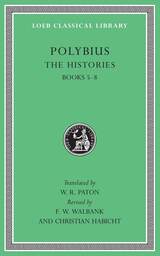
Hellenistic history.
The historian Polybius (ca. 200–118 BC) was born into a leading family of Megalopolis in the Peloponnese (Morea) and served the Achaean League in arms and diplomacy for many years, favoring alliance with Rome. From 168 to 151 he was held hostage in Rome, where he became a friend of Lucius Aemilius Paulus and his two sons, especially Scipio Aemilianus, whose campaigns, including the destruction of Carthage, he later attended. Late in his life he became a trusted mediator between Greece and the Romans; helped in the discussions that preceded the final war with Carthage; and after 146 was entrusted by the Romans with the details of administration in Greece.
Polybius’ overall theme is how and why the Romans spread their power as they did. The main part of his history covers the years 264–146 BC, describing the rise of Rome, her destruction of Carthage, and her eventual domination of the Greek world. It is a great work: accurate, thoughtful, largely impartial, based on research, and full of insight into customs, institutions, geography, the causes of events, and the character of peoples. It is a vital achievement of the first importance despite the incomplete state in which all but the first five of its original forty books have reached us.
For this edition, W. R. Paton’s excellent translation, first published in 1922, has been thoroughly revised, the Büttner-Wobst Greek text corrected, and explanatory notes and a new introduction added, all reflecting the latest scholarship.
The Loeb Classical Library edition of Polybius is in six volumes.
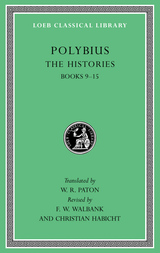
Hellenistic history.
The historian Polybius (ca. 200–118 BC) was born into a leading family of Megalopolis in the Peloponnese (Morea) and served the Achaean League in arms and diplomacy for many years, favoring alliance with Rome. From 168 to 151 he was held hostage in Rome, where he became a friend of Lucius Aemilius Paulus and his two sons, especially Scipio Aemilianus, whose campaigns, including the destruction of Carthage, he later attended. Late in his life he became a trusted mediator between Greece and the Romans; helped in the discussions that preceded the final war with Carthage; and after 146 was entrusted by the Romans with the details of administration in Greece.
Polybius’ overall theme is how and why the Romans spread their power as they did. The main part of his history covers the years 264–146 BC, describing the rise of Rome, her destruction of Carthage, and her eventual domination of the Greek world. It is a great work: accurate, thoughtful, largely impartial, based on research, and full of insight into customs, institutions, geography, the causes of events, and the character of peoples. It is a vital achievement of the first importance despite the incomplete state in which all but the first five of its original forty books have reached us.
For this edition, W. R. Paton’s excellent translation, first published in 1922, has been thoroughly revised, the Büttner-Wobst Greek text corrected, and explanatory notes and a new introduction added, all reflecting the latest scholarship.
The Loeb Classical Library edition of Polybius is in six volumes.
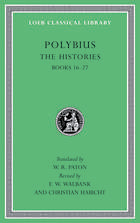
Hellenistic history.
The historian Polybius (ca. 200–118 BC) was born into a leading family of Megalopolis in the Peloponnese (Morea) and served the Achaean League in arms and diplomacy for many years, favoring alliance with Rome. From 168 to 151 he was held hostage in Rome, where he became a friend of Lucius Aemilius Paulus and his two sons, especially Scipio Aemilianus, whose campaigns, including the destruction of Carthage, he later attended. Late in his life he became a trusted mediator between Greece and the Romans; helped in the discussions that preceded the final war with Carthage; and after 146 was entrusted by the Romans with the details of administration in Greece.
Polybius’ overall theme is how and why the Romans spread their power as they did. The main part of his history covers the years 264–146 BC, describing the rise of Rome, her destruction of Carthage, and her eventual domination of the Greek world. It is a great work: accurate, thoughtful, largely impartial, based on research, and full of insight into customs, institutions, geography, the causes of events, and the character of peoples. It is a vital achievement of the first importance despite the incomplete state in which all but the first five of its original forty books have reached us.
For this edition, W. R. Paton’s excellent translation, first published in 1922, has been thoroughly revised, the Büttner-Wobst Greek text corrected, and explanatory notes and a new introduction added, all reflecting the latest scholarship.
The Loeb Classical Library edition of Polybius is in six volumes.
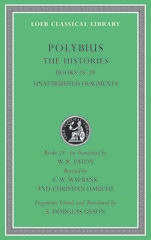
Hellenistic history.
The historian Polybius (ca. 200–118 BC) was born into a leading family of Megalopolis in the Peloponnese (Morea) and served the Achaean League in arms and diplomacy for many years, favoring alliance with Rome. From 168 to 151 he was held hostage in Rome, where he became a friend of Lucius Aemilius Paulus and his two sons, especially Scipio Aemilianus, whose campaigns, including the destruction of Carthage, he later attended. Late in his life he became a trusted mediator between Greece and the Romans; helped in the discussions that preceded the final war with Carthage; and after 146 was entrusted by the Romans with the details of administration in Greece.
Polybius’ overall theme is how and why the Romans spread their power as they did. The main part of his history covers the years 264–146 BC, describing the rise of Rome, her destruction of Carthage, and her eventual domination of the Greek world. It is a great work: accurate, thoughtful, largely impartial, based on research, and full of insight into customs, institutions, geography, the causes of events, and the character of peoples. It is a vital achievement of the first importance despite the incomplete state in which all but the first five of its original forty books have reached us.
For this edition, W. R. Paton’s excellent translation, first published in 1922, has been thoroughly revised, the Büttner-Wobst Greek text corrected, and explanatory notes and a new introduction added, all reflecting the latest scholarship.
The Loeb Classical Library edition of Polybius is in six volumes.
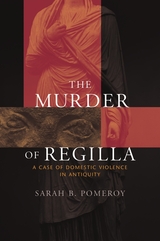
From an acclaimed author comes a fascinating story of the life, marriage, and death of an all but forgotten Roman woman. Born to an illustrious Roman family in 125 CE, Regilla was married at the age of fifteen to Herodes, a wealthy Greek who championed his country's values at a time when Rome ruled.
Twenty years later--and eight months pregnant with her sixth child--Regilla died under mysterious circumstances, after a blow to the abdomen delivered by Herodes' freedman. Regilla's brother charged Herodes with murder, but a Roman court (at the urging of Marcus Aurelius) acquitted him. Sarah Pomeroy's investigation suggests that despite Herodes' erection of numerous monuments to his deceased wife, he was in fact guilty of the crime.
A pioneer in the study of ancient women, Pomeroy gathers a broad, unique array of evidence, from political and family history to Greco-Roman writings and archaeology, to re-create the life and death of Regilla. Teasing out the tensions of class, gender, and ethnicity that gird this story of marriage and murder, Pomeroy exposes the intimate life and tragedy of an elite Roman couple. Part archaeological investigation, part historical re-creation, and part detective story, The Murder of Regilla will appeal to all those interested in the private lives of the classical world and in a universal and compelling story of women and family in the distant past.
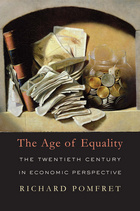
In 1900 the global average life expectancy at birth was thirty-one years. By 2000 it was sixty-six. Yet, alongside unprecedented improvements in longevity and material well-being, the twentieth century also saw the rise of fascism and communism and a second world war followed by a cold war. This book tells the story of the battles between economic systems that defined the last century and created today's world.
The nineteenth century was a period of rapid economic growth characterized by relatively open markets and more personal liberty, but it also brought great inequality within and between nations. The following century offered sharp challenges to free-wheeling capitalism from both communism and fascism, whose competing visions of planned economic development attracted millions of people buffeted by the economic storms of the 1930s. The Age of Equality describes the ways in which market-oriented economies eventually overcame the threat of these visions and provided a blueprint for reform in nonmarket economies. This was achieved not through unbridled capitalism but by combining the efficiency and growth potential of markets with government policies to promote greater equality of opportunity and outcome. Following on the heels of economic reform, rapid catch-up growth in countries such as China, India, Indonesia, Brazil, and Poland helped to reduce global inequality.
At a time when inequality is on the rise in nations as disparate as the United States and Egypt, Pomfret’s interpretation of how governments of market economies faced the challenges of the twentieth century is both instructive and cautionary.
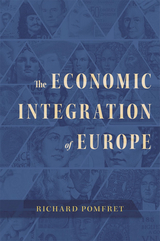
The clearest and most up-to-date account of the achievements—and setbacks—of the European Union since 1945.
Europe has been transformed since the Second World War. No longer a checkerboard of entirely sovereign states, the continent has become the largest single-market area in the world, with most of its members ceding certain economic and political powers to the central government of the European Union. This shift is the product of world-historical change, but the process is not well understood. The changes came in fits and starts. There was no single blueprint for reform; rather, the EU is the result of endless political turmoil and dazzling bureaucratic gymnastics. As Brexit demonstrates, there are occasional steps backward, too. Cutting through the complexity, Richard Pomfret presents a uniquely clear and comprehensive analysis of an incredible achievement in economic cooperation.
The Economic Integration of Europe follows all the major steps in the creation of the single market since the postwar establishment of the European Coal and Steel Community. Pomfret identifies four stages of development: the creation of a customs union, the deepening of economic union with the Single Market, the years of monetary union and eastward expansion, and, finally, problems of consolidation. Throughout, he details the economic benefits, costs, and controversies associated with each step in the evolution of the EU. What lies ahead? Pomfret concludes that, for all its problems, Europe has grown more prosperous from integration and is likely to increase its power on the global stage.

On January 5, 1858, when British and French forces stormed Canton, the British seized a sizable quantity of archival materials belonging to the yamen of high functionaries of Kwangtung. After the documents had served their initial purpose of helping the British in the administration of Canton and in their subsequent dealings with the Chinese, they were stashed away and became mixed up with a much larger bulk of Chinese-language manuscripts in the Chinese Secretary's Office of the British Legation at Peking. For over a century, these important documents of the Opium War period remained unrecognized and were seldom exploited by scholars.
The collection as it stands today contains two thousand items of varying length ranging from a single page to multi-ts’e works, totaling nearly 10,000 folios. Although a few of the documents date back to the last quarter of the 18th century, the majority fall within the first half of the 19th. David Pong presents an extensive and carefully researched list of these documents, as well as an index, a bibliography, a concordance, and a critical introduction. With the aid of this invaluable research guide to a very important collection of archival materials, the Public Record Office has been able to reclassify its rich Chinese-language collection, and scholars will now be able to use these materials far more effectively in the future.

Is Venezuela’s Bolivarian revolution under Hugo Chávez truly revolutionary? Most books and articles tend to view the Chávez government in an either-or fashion. Some see the president as the shining knight of twenty-first-century socialism, while others see him as an avenging Stalinist strongman. Despite passion on both sides, the Chávez government does not fall easily into a seamless fable of emancipatory or authoritarian history, as these essays make clear.
A range of distinguished authors consider the nature of social change in contemporary Venezuela and explore a number of themes that help elucidate the sources of the nation’s political polarization. The chapters range from Fernando Coronil’s “Bolivarian Revolution,” which examines the relationship between the state’s social body (its population) and its natural body (its oil reserves), to an insightful look at women’s rights by Cathy A. Rakowski and Gioconda Espina. This volume shows that, while the future of the national process is unclear, the principles elaborated by the Chávez government are helping articulate a new Latin American left.

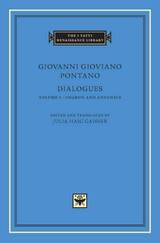
Giovanni Pontano (1426–1503), whose academic name was Gioviano, was the most important Latin poet of the fifteenth century as well as a leading statesman who served as prime minister to the Aragonese kings of Naples. His Dialogues are our best source for the humanist academy of Naples which Pontano led for several decades. They provide a vivid picture of literary life in the capital of the Aragonese seaborne empire, based in southern Italy and the Western Mediterranean. This first volume contains the two earliest of Pontano’s five dialogues. Charon, set in the underworld of classical mythology, illustrates humanist attitudes to a wide range of topics, satirizing the follies and superstitions of humanity. Antonius, a Menippean satire named for the founder of the Neapolitan Academy, Antonio Beccadelli, is set in the Portico Antoniano in downtown Naples, where the academicians commemorate and emulate their recently-deceased leader, conversing on favorite topics and stopping from time to time to interrogate passersby.
This volume contains a freshly-edited Latin text of these dialogues and the first translation of them into English.

Giovanni Gioviano Pontano (1429–1503) served five kings of Naples as a courtier, official, and diplomat, and earned even greater fame as a scholar, prose author, and poet. His Dialogues reflect his diverse interests in religion, philosophy, and literature, as well as in everyday life in fifteenth-century Naples. They are especially important for their vivid picture of the contemporary gatherings of Pontano and his friends in the humanist academy over which he presided from around 1471 until shortly before his death.
Volume 2 includes the Actius, named for one of its principal speakers, the great Neo-Latin poet Jacopo Sannazaro, and contains a perceptive treatment of poetic rhythm, the first full treatment of the Latin hexameter in the history of philology. The dialogue continues with a discussion of style and method in history writing, a landmark in the history of historiography. This is a new critical edition of the Actius and the first translation of this dialogue into English.

Giovanni Gioviano Pontano (1429–1503) served five kings of Naples as a courtier, official, and diplomat, and earned even greater fame as a scholar, prose author, and poet. His Dialogues reflect his diverse interests in religion, philosophy, and literature, as well as in everyday life in fifteenth-century Naples. They are especially important for their vivid picture of the contemporary gatherings of Pontano and his friends in the humanist academy over which he presided from around 1471 until shortly before his death.
This volume completes the I Tatti edition of Pontano’s five surviving dialogues and features both Aegidius and Asinus. The conversation in Aegidius, named for the Augustinian theologian Giles of Viterbo, ranges over various topics, including creation, dreams, free will, the immortality of the soul, the relation between heaven and earth, language, astrology, and mysticism. The Asinus is less a dialogue than a fantastical autobiographical comedy in which Pontano himself is represented as having gone mad and fallen in love with an ass. This is the first translation of these dialogues into English.


A renowned Renaissance poet’s homage to Naples makes its debut in modern English translation.
Giovanni Pontano (1429–1503), whose academic name was Gioviano, was one of the great scholar-poets of the Renaissance as well as a leading statesman who served as prime minister to the Aragonese kings of southern Italy. The dominant literary figure of quattrocento Naples, Pontano produced literary works in several genres and was the leader of the Neapolitan academy. The two works included in the present volume, broadly inspired by Virgil, might be considered Pontano’s love songs to the landscapes of Naples. The Eclogues offer a spectacular, panoramic tour of the Bay of Naples region, even as they focus on intimate domestic scenes and allegorize the people and places of the poet’s world. The Garden of the Hesperides is a work of brilliant erudition on an unprecedented poetic topic: the cultivation of citrus trees and the splendid pleasures of gardens. This volume features a newly established Latin text of the Garden of the Hesperides as well as the first published translations of both works into English.

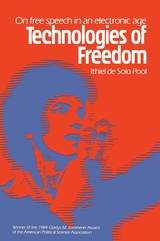

At the time of his death in 1984, Ithiel de Sola Pool had completed a rough draft of a manuscript he had been working on for years. It contained his vision of a new world resulting from the social and political consequences of communications technology. Edited into an elegant synthesis of technology, history, politics, and economics by his friend and fellow scholar, Eli Noam, this is the intellectual legacy of one of our century's wisest social critics.
In the book Pool foresees dramatic changes that will revolutionize culture and society as much as printing did five centuries ago. Because distance no longer places a significant economic burden on communications, he predicts complex changes in the spatial patterns of human settlements. People will not simply move away from cities and disperse, but will cluster together in new ways, for different reasons, and in different locations. The increasingly lower cost of long distance communication will also cause political movements that formerly would have been confined to their country of origin to spill over national boundaries, creating threats to national sovereignty. Furthermore, the ability to customize messages and target them to specific audiences could also work to undermine social and political cohesion. What will it mean to the effective functioning of democratic societies, Pool asks, if the influence of the mass media weakens and citizens can no longer agree on a common agenda of problems, let alone solutions to those problems? Pool also shows how the coming convergence of print and electronic media could lead, inadvertently, to the erosion of the system of free public discourse that we value so highly.
Technologies without Boundaries is a book of great social and political import, accessible—and necessary—to thoughtful readers living in this century and beyond.
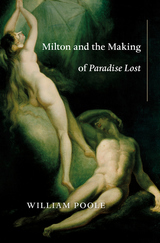
Milton and the Making of Paradise Lost tells the story of John Milton's life as England’s self-elected national poet and explains how the single greatest poem of the English language came to be written.
In early 1642 Milton—an obscure private schoolmaster—promised English readers a work of literature so great that “they should not willingly let it die.” Twenty-five years later, toward the end of 1667, the work he had pledged appeared in print: the epic poem Paradise Lost. In the interim, however, the poet had gone totally blind and had also become a controversial public figure—a man who had argued for the abolition of bishops, freedom of the press, the right to divorce, and the prerogative of a nation to depose and put to death an unsatisfactory ruler. These views had rendered him an outcast.
William Poole devotes particular attention to Milton’s personal situation: his reading and education, his ambitions and anxieties, and the way he presented himself to the world. Although always a poet first, Milton was also a theologian and civil servant, vocations that informed the composition of his masterpiece. At the emotional center of this narrative is the astounding fact that Milton lost his sight in 1652. How did a blind man compose this staggeringly complex, intensely visual work? Poole opens up the epic worlds and sweeping vistas of Milton’s masterpiece to modern readers, first by exploring Milton’s life and intellectual preoccupations and then by explaining the poem itself—its structure, content, and meaning.
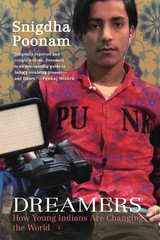
What do India’s millennials want and how are they transforming one of the youngest, most populous nations in the world?
More than half of India is under the age of twenty-five, but India’s millennials are nothing like their counterparts in the West. In a country that is increasingly characterized by ambition and crushing limitations, this is a generation that cannot—and will not—be defined on anything but their own terms. They are wealth-chasers, hucksters, and fame-hunters, desperate to escape their narrow prospects. They are the dreamers.
Award-winning journalist Snigdha Poonam traveled through the small towns of northern India to investigate the phenomenon that is India’s Generation Y. From dubious entrepreneurs to political aspirants, from starstruck strivers to masterly swindlers, these are the clickbaiters who create viral content for Facebook and the internet scammers who stalk you at home, but they are also defiant student union leaders determined to transform campus life. Poonam made her way—on carts and buses, in cars and trucks—through India’s badlands to uncover a theater of toxic masculinity, a spirited brew of ambition, and a hunger for change that is bound to drive the future of the country.

The American family is changing. Divorce, single parents, and stepfamilies are redefining the way we live together and raise our children. Is this a change for the worse? David Popenoe sets out the case for fatherhood and the two-parent family as the best arrangement for ensuring the well-being and future development of children.
His argument has two critical assumptions, which he supports with evidence from a variety of disciplines, including anthropology, biology, and history. The first is that children flourish best when raised by a father and a mother with their differing psychological and behavioral traits. The second is that marriage, which serves to hold fathers to the mother-child bond, is an institution we must strengthen if the decline of fatherhood is to be reversed.

Beginning in 1950, the state of Israel prosecuted and jailed dozens of Holocaust survivors who had served as camp kapos or ghetto police under the Nazis. At last comes the first full account of the kapo trials, based on records newly declassified after forty years.
In December 1945, a Polish-born commuter on a Tel Aviv bus recognized a fellow rider as the former head of a town council the Nazis had established to manage the Jews. When he denounced the man as a collaborator, the rider leapt off the bus, pursued by passengers intent on beating him to death. Five years later, to address ongoing tensions within Holocaust survivor communities, the State of Israel instituted the criminal prosecution of Jews who had served as ghetto administrators or kapos in concentration camps.
Dan Porat brings to light more than three dozen little-known trials, held over the following two decades, of survivors charged with Nazi collaboration. Scouring police investigation files and trial records, he found accounts of Jewish policemen and camp functionaries who harassed, beat, robbed, and even murdered their brethren. But as the trials exposed the tragic experiences of the kapos, over time the courts and the public shifted from seeing them as evil collaborators to victims themselves, and the fervor to prosecute them abated.
Porat shows how these trials changed Israel’s understanding of the Holocaust and explores how the suppression of the trial records—long classified by the state—affected history and memory. Sensitive to the devastating options confronting those who chose to collaborate, yet rigorous in its analysis, Bitter Reckoning invites us to rethink our ideas of complicity and justice and to consider what it means to be a victim in extraordinary circumstances.

Since the end of World War II the Israeli public has bitterly debated the guilt-ridden question of whether the Jewish community of Palestine really did everything in its power to rescue Jews in Nazi-occupied countries. Dina Porat gives a searching analysis of the record, basing her conclusions on archival material and other primary sources, hitherto mostly unused. She investigates how and when the Zionist leadership in Palestine fully understood that Europe's Jews were facing annihilation; what rescue plans they developed and what resources were allocated to the effort; what help they tried to get from free-world Jewry and from the British and American governments. And she looks at what went wrong—why in the end so little was done.
Porat struggles with these painful questions of accountability in the light of the Zionist enterprise, its ideologies and internal disputes. She describes the ambivalent attitude of the Zionists in Palestine, who first viewed most of the European Jews as lambs led to slaughter, compared the victims of the Holocaust unfavorably with the tough pioneers of Zion and those few in Europe who fought back, and only gradually understood that every daily struggle was a form of fighting back. Above all, the priorities of the Jewish community in Palestine reflected its overriding goal of building an independent Jewish state despite meager resources, crucial dependence on the good will of friendly powers, and a small number of survivors (instead of the millions they hoped to absorb).
The Blue and the Yellow Stars of David is an important chapter in the history of Israel and the history of World War II. And as the story of a leadership that was unable to respond adequately to a tragically urgent situation, this book focuses on questions of wide and abiding concern.


Standing guard around the tomb of Qin Shihuangdi, the ranks of a terracotta army bear silent witness to the vast power of the First Emperor of the Qin Dynasty, who unified China in 221 BCE. Six thousand warriors and horses make up the army, while chariots, a military guard, and a command post complete the host. A new look at one of the most spectacular finds in the annals of archaeology, this book also considers the historical and archaeological context of the Terracotta Army, as well as the extensive research and excavation carried out since its discovery in 1974.
In richly illustrated chapters, experts in the field describe the Qin's rise and military conquest, the empire's ideology and practices, and the emperor's achievements and legacy. The authors examine the site itself, including new discoveries such as terracotta bureaucrats, acrobats, and strongmen, life-size bronze birds, hundreds of suits of stone armor, and terracotta warriors with colored faces preserved with new technology.
From explorations of the massive mausoleum and the rituals that surrounded it, to explanations of the actual manufacture of the Terracotta Army, the book offers a detailed and authoritative tour of one of ancient history's most eloquent memorials, with all it says of China's long and coherent cultural past--and future potential.


Agamemnon led a ten-year-long struggle at Troy only to return home and die a pathetic death at his wife’s hands. Yet while Agamemnon’s story exerts an outsize influence—rivalled by few epic personalities—on the poetic narratives of the Iliad and Odyssey, scholars have not adequately considered his full portrait. What was Agamemnon like as a character for Homer and his audience? More fundamentally, how should we approach the topic of characterization itself, following the discoveries of Milman Parry, Albert Lord, and their successors?
Andrew Porter explains the expression of characterization in Homer’s works, from an oral-traditional point of view, and through the resonance of words, themes, and “back stories” from both the past and future. He analyzes Agamemnon’s character traits in the Iliad, including his qualities as a leader, against events such as his tragic homecoming narrative in the Odyssey. Porter’s findings demonstrate that there is a traditional depth of characterization embedded in the written pages of these once-oral epics, providing a shared connection between the ancient singer and his listeners.






This dazzling and yet intimate book is the first modern one-volume history of London from Roman times to the present. An extraordinary city, London grew from a backwater in the Classical age into an important medieval city, a significant Renaissance urban center, and a modern colossus. Roy Porter paints a detailed landscape--from the grid streets and fortresses of Julius Caesar and William the Conqueror to the medieval, walled "most noble city" of churches, friars, and crown and town relationships. Within the crenelated battlements, manufactures and markets developed and street-life buzzed.
London's profile in 1500 was much as it was at the peak of Roman power. The city owed its courtly splendor and national pride of the Tudor Age to the phenomenal expansion of its capital. It was the envy of foreigners, the spur of civic patriotism, and a hub of culture, architecture, great literature, and new religion. From the eighteenth through the twentieth centuries, London experienced a cruel civil war, raging fires, enlightenment in thought, government, and living, and the struggle and benefits of empire. From the lament that "London was but is no more" to "you, who are to stand a wonder to all Years and ages...a phoenix," London became an elegant, eye-catching, metropolitan hub. It was a mosaic, Porter shows, that represented the shared values of a people--both high and low born--at work and play.
London was and is a wonder city, a marvel. Not since ancient times has there been such a city--not eternal, but vibrant, living, full of a free people ever evolving. In this transcendent book, Roy Porter touches the pulse of his hometown and makes it our own, capturing London's fortunes, people, and imperial glory with brio and wit.

The Hajj, one of the five pillars of Islam, is the largest pilgrimage in the world today and a sacred duty for all Muslims. Each year, millions of the faithful from around the world make the pilgrimage to Makkah, the birthplace of Islam where the Prophet Muhammad received his revelation.
With contributions from renowned experts Muhammad Abdel Haleem, Hugh Kennedy, Robert Irwin, and Ziauddin Sardar, this fascinating book pulls together many strands of Hajj, its rituals, history, and modern manifestations. Travel was once a hazardous gamble, yet devoted Muslims undertook the journey to Makkah, documenting their experiences in manuscripts, wall paintings, and early photographs, many of which are presented here. Through a wealth of illustrations including pilgrims' personal objects, souvenirs, and maps, Hajj provides a glimpse into this important holy rite for Muslim readers already grounded in the tradition and non-Muslims who cannot otherwise participate.
Hajj does not, however, merely trace pilgrimages of the past. The Hajj is a living tradition, influenced by new conveniences and obstacles. Graffiti, consumerism, and state lotteries all now play a role in this time-honored practice. This book opens out onto the full sweep of the Hajj: a sacred path walked by early Islamic devotees and pre-Islamic Arabians; a sumptuous site of worship under the care of sultans; and an expression of faith in the modern world.
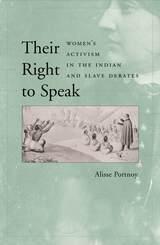
When Alisse Portnoy recovered petitions from the early 1830s that nearly 1,500 women sent to the U.S. Congress to protest the forced removal of Native Americans in the South, she found the first instance of women's national, collective political activism in American history. In this groundbreaking study, Portnoy links antebellum Indian removal debates with crucial, simultaneous debates about African Americans--abolition of slavery and African colonization--revealing ways European American women negotiated prohibitions to make their voices heard.
Situating the debates within contemporary, competing ideas about race, religion, and nation, Portnoy examines the means by which women argued for a "right to speak" on national policy. Women's participation in the debates was constrained not only by gender but also by how these women--and the men with whom they lived and worshipped--imagined Native and African Americans as the objects of their advocacy and by what they believed were the most benevolent ways to aid the oppressed groups.
Cogently argued and engagingly written, this is the first study to fully integrate women's, Native American, and African American rights debates.
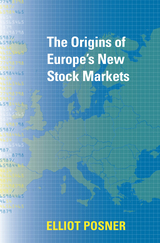
Between 1995 and 2007, financial elites in more than a dozen western European countries engaged in a cross-border battle to create some twenty new stock markets, many of which were explicitly modeled on the American Nasdaq.
The resulting high-risk, high-reward markets facilitated wealth creation, rewarded venture capitalists, and drew major U.S. financial players to Europe. But they also chipped away at the European social compacts between national governments and citizens, opening the door of smaller company finance to the broad trend of marketization and its bounties, and further subjecting European households and family businesses to the rhythms of global capital.
Elliot Posner explores the causes of Europe’s emergence as a global financial power, addressing classic and new questions about the origins of markets and their relationship to politics and bureaucracy. In doing so, he attributes the surprising large-scale transformation of Europe’s capital markets to the rise of the European Union as a global political force. The effect of Europe’s financial ascendance will have major ramifications around the world, and Posner’s analysis will push market participants, policymakers, and academics to rethink the sources of financial change in Europe and beyond.
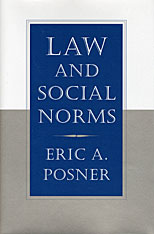
What is the role of law in a society in which order is maintained mostly through social norms, trust, and nonlegal sanctions? Eric Posner argues that social norms are sometimes desirable yet sometimes odious, and that the law is critical to enhancing good social norms and undermining bad ones. But he also argues that the proper regulation of social norms is a delicate and complex task, and that current understanding of social norms is inadequate for guiding judges and lawmakers. What is needed, and what this book offers, is a model of the relationship between law and social norms. The model shows that people's concern with establishing cooperative relationships leads them to engage in certain kinds of imitative behavior. The resulting behavioral patterns are called social norms.
Posner applies the model to several areas of law that involve the regulation of social norms, including laws governing gift-giving and nonprofit organizations; family law; criminal law; laws governing speech, voting, and discrimination; and contract law. Among the engaging questions posed are: Would the legalization of gay marriage harm traditional married couples? Is it beneficial to shame criminals? Why should the law reward those who make charitable contributions? Would people vote more if non-voters were penalized? The author approaches these questions using the tools of game theory, but his arguments are simply stated and make no technical demands on the reader.

The ever-increasing exchange of goods and ideas among nations, as well as cross-border pollution, global warming, and international crime, pose urgent questions for international law. Here, two respected scholars provide an intellectual framework for assessing these pressing legal problems from a rational choice perspective.
The approach assumes that states are rational, forward-looking agents which use international law to address the actions of other states that may have consequences for their own citizens, and to obtain the benefits of international cooperation. It further assumes that in the absence of a central enforcement agency—that is, a world government—international law must be self-enforcing. States must believe that if they violate international agreements, other states will retaliate.
Consequently, Eric A. Posner and Alan O. Sykes devote considerable attention to the challenges of enforcing international law, which begin with the difficulties of determining what it is. In the absence of an international constitution, the sources for international law are vague. Lawyers must rely on statements contained in all manner of official documents and on simple observation of states’ behavior. This looseness leads international institutions such as the United Nations to deliver conflicting interpretations of the law’s most basic principles. The authors describe the conditions under which international law succeeds or fails, across a wide range of issues, including war crimes, human rights, international criminal law, principles of state responsibility, law of the sea, international trade regulation, and international investment law.


This study surveys the role of state enterprise in Italy over the last fifteen years. Focusing on the history and recent growth of the public sector there, the authors examine the structure, performance, and control of some typical state enterprises, the methods of finance, and the pattern of investment.
Their pioneering work, although it formulates no easy answers about the ideal role of public enterprise, marshals a great many useful facts and arguments concerning the one outstanding national experiment in this direction to date.

President Bill Clinton’s year of crisis, which began when his affair with Monica Lewinsky hit the front pages in January 1998, engendered a host of important questions of criminal and constitutional law, public and private morality, and political and cultural conflict.
In a book written while the events of the year were unfolding, Richard Posner presents a balanced and scholarly understanding of the crisis that also has the freshness and immediacy of journalism. Posner clarifies the issues and eliminates misunderstandings concerning facts and the law that were relevant to the investigation by Independent Counsel Kenneth Starr and to the impeachment proceeding itself. He explains the legal definitions of obstruction of justice and perjury, which even many lawyers are unfamiliar with. He carefully assesses the conduct of Starr and his prosecutors, including their contacts with the lawyers for Paula Jones and their hardball tactics with Monica Lewinsky and her mother. He compares and contrasts the Clinton affair with Watergate, Iran–Contra, and the impeachment of Andrew Johnson, exploring the subtle relationship between public and private morality. And he examines the place of impeachment in the American constitutional scheme, the pros and cons of impeaching President Clinton, and the major procedural issues raised by both the impeachment in the House and the trial in the Senate. This book, reflecting the breadth of Posner’s experience and expertise, will be the essential foundation for anyone who wants to understand President Clinton’s impeachment ordeal.
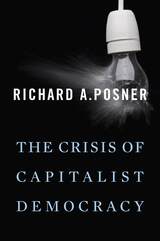
Following his timely and well-received A Failure of Capitalism, Richard Posner steps back to take a longer view of the continuing crisis of democratic capitalism as the American and world economies crawl gradually back from the depths to which they had fallen in the autumn of 2008 and the winter of 2009.
By means of a lucid narrative of the crisis and a series of analytical chapters pinpointing critical issues of economic collapse and gradual recovery, Posner helps non-technical readers understand business-cycle and financial economics, and financial and governmental institutions, practices, and transactions, while maintaining a neutrality impossible for persons professionally committed to one theory or another. He calls for fresh thinking about the business cycle that would build on the original ideas of Keynes. Central to these ideas is that of uncertainty as opposed to risk. Risk can be quantified and measured. Uncertainty cannot, and in this lies the inherent instability of a capitalist economy.
As we emerge from the financial earthquake, a deficit aftershock rumbles. It is in reference to that potential aftershock, as well as to the government’s stumbling efforts at financial regulatory reform, that Posner raises the question of the adequacy of our democratic institutions to the economic challenges heightened by the greatest economic crisis since the Great Depression. The crisis and the government’s energetic response to it have enormously increased the national debt at the same time that structural defects in the American political system may make it impossible to pay down the debt by any means other than inflation or devaluation.
READERS
Browse our collection.
PUBLISHERS
See BiblioVault's publisher services.
STUDENT SERVICES
Files for college accessibility offices.
UChicago Accessibility Resources
home | accessibility | search | about | contact us
BiblioVault ® 2001 - 2024
The University of Chicago Press









